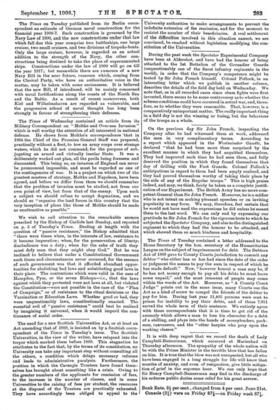We wish to call attention to the remarkable sermon preached
by the Bishop of Carlisle last Sunday, and reported on p. 5 of Tuesday's Times. Dealing at length with the question of "passive resistance," the Bishop admitted that "there were times when, in the interests of law, resistance to it became imperative ; when, for the preservation of liberty, disobedience was a duty ; when for the sake of truth they must defy man that they might obey God." But he was inclined to believe that under a Constitutional Government such times and circumstances never occurred, for the essence of such government was that it afforded abundant oppor- tunities for abolishing bad laws and substituting good laws in their place. The contentions which were valid in the case of Hampden, Pym, or the seven Bishops—i.e., that the laws against which they protested were not laws at all, but violated the Constitution—were not possible in the case of the "Plan of Campaign," or of resistance to the ritual decisions or the Vaccination or Education Laws. Whether good or bad, they were unquestionably laws, constitutionally enacted. The essential evil of "passive resistance" could best be realised by imagining it universal, when it would imperil the con- tinuance of social order.


































 Previous page
Previous page